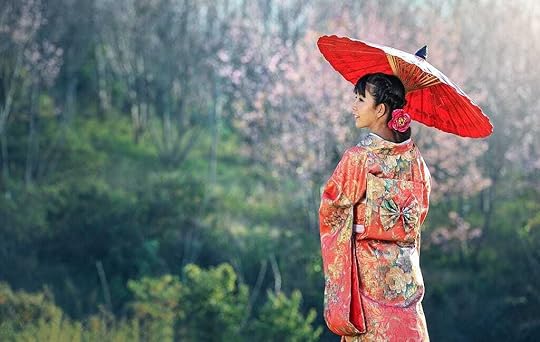Alia Amir's Blog: Languaging, literature, culture and landscape
June 4, 2025
Policing Women Online: From Sana Yousaf to Mahira Khan, Social Media Shame Reinforces Patriarchy in…
 Photo by Prateek Katyal on Unsplash
Photo by Prateek Katyal on UnsplashIn Pakistan’s deeply patriarchal society, the language of shame and policing has increasingly permeated social media spaces, shaping public attitudes toward women, especially those in visible roles. This toxic discourse became starkly visible following the tragic murder of 17-year-old TikTok influencer Sana Yousaf, where instead of widespread empathy, many online responses were marked by cruelty and victim-blaming. The toxic rhetoric surrounding her death illustrates how digital platforms can become arenas for enforcing patriarchal control through language and social policing.
 Photo by Mihai Surdu on Unsplash
Photo by Mihai Surdu on UnsplashSimilarly, the harassment of Pakistani actress Maira Khan during the promotion of her film in London further underscores this pattern. Beyond the public act of harassment, the most virulent backlash occurred online — where social media users blamed Maira’s profession, questioned her respectability, and implied that as an actress, she “deserved” less respect and had forfeited her right to bodily autonomy. This online vitriol reflects a broader cultural tendency to delegitimize women in entertainment, reinforcing harmful narratives that women in public-facing roles are inherently less deserving of protection and dignity.
This pattern extends across professions and political lines. Politicians like Maryam Nawaz Sharif and even the sisters of former Prime Minister Imran Khan have been targeted online, where criticism of their political views is often laced with deeply gendered, personal attacks. Their appearance, tone of voice, and visibility are scrutinized through a lens of shame, not policy.
These cases are emblematic of how patriarchal norms are reproduced and amplified in digital spaces through language policing, perpetuating cycles of shame and control. Addressing this requires not only condemning such acts but critically examining how discourse on social media sustains these oppressive frameworks.
[image error]May 21, 2024
The exodus of international students and the possibility of brain drain in Britain
 Photo by Aron Van de Pol on Unsplash
Photo by Aron Van de Pol on UnsplashThe UK has long been an attractive destination for the best and brightest global minds, drawing talented students and scholars from around the world to its prestigious universities and vibrant academic communities. However, with the government about to publish its review into the graduate visa, this long-standing appeal may be in jeopardy. Potential changes or restrictions to this visa program could make it significantly more challenging for international students to pursue their studies in the UK and secure employment opportunities after graduation, potentially leading to a brain drain that is causing immense financial losses and depriving Europe of its brightest minds. If the UK’s policies become less welcoming, it is likely that many international students will turn their attention to other nations that offer more favorable conditions.
 Photo by Kyle Glenn on Unsplash
Photo by Kyle Glenn on UnsplashShould the UK’s review result in an exodus of international students, the consequences could be far-reaching and detrimental to the entire European region. Not only would it deprive the country of the invaluable contributions these individuals bring to its academic and research landscapes, but it could also have broader economic and cultural implications. The brain drain phenomenon, where highly skilled and talented individuals leave for greener pastures, is already inflicting substantial financial damage across Europe and depriving it of its most promising minds.
As the world becomes increasingly interconnected and competitive, nations that embrace and nurture global talent will likely emerge as leaders in the realms of education, research, and innovation. The UK’s decision on the graduate visa matter could have profound implications for its standing on the global stage, potentially diminishing its ability to attract and retain the very minds that have historically fueled its academic and intellectual prowess.
[image error]March 18, 2024
“There is nothing to writing. All you do is sit down at a typewriter and bleed.”
 Photo by Hannah Olinger on Unsplash
Photo by Hannah Olinger on Unsplash“There is nothing to writing. All you do is sit down at a typewriter and bleed.”
Ernest Hemingway
[image error]January 28, 2024
Non-Fiction Book Proposal Writing Workshop!
Date: 1–02–2024
Time: 07:00–08:30 (UK)/ 08:00–09:30 pm (Sweden)
Location: zoom
For registration: comment below 🚀
 [image error]
[image error]
January 14, 2024
A Symphony of Self
 Photo by Meriç Dağlı on Unsplash
Photo by Meriç Dağlı on UnsplashAmidst the labyrinth of self-identity,
Being authentically myself at this moment in time,
I shed layers,
Residues of my former selves.
Abandoning the self that no longer reflects me,
Cleansing it from my bloodstream,
Purging it away from my breath.
Yet, the ghosts linger,
Persistently, I scrape away the traces,
Purging my skin from the haunting refrain.
If only being ‘me-me’ was tied to a specific time,
And only the past could define it by the ones who birthed me,
Or on the basis of who birthed me,
Based on their attire, their cuisine, their languages,
Brought into existence where they were born,
Where they lived,
Embedded in the warp and weft of time.
Yet, in this labyrinth of layers,
I ask myself, who am I then?
 Photo by Ashley Batz on Unsplash
Photo by Ashley Batz on UnsplashThe ‘me-me’ is not static but a fluid thread,
Woven and enmeshed through numerous layers.
In this present moment,
here and now,
The question of ‘Who am I now?’ resonates,
With no lingering ghosts of the past.
Some residues remain.
Some shadows persist.
The causality is evident,
A symphony of consequences resulting from my choices is manifested in this dance.
I stand here because of who I was then.
I was there because of what I would become now.
If only being ‘me-me’ is in this present moment,
here and now determined by,
What I eat,
Which languages I speak,
What I wear,
Would I consider this a reference point for the future?
[image error]December 17, 2023
Navigating Dyslexia Perceptions: Insights from Turkish EFL Teachers
 Photo by Hal Gatewood on Unsplash
Photo by Hal Gatewood on UnsplashIn our recent study, we delved into dyslexia perceptions among 176 Turkish pre-service EFL teachers, utilizing the insightful Knowledge and Beliefs about Developmental Dyslexia Scale (KBDDS) by Soriano-Ferrer and Echegaray-Bengoa (2014).
Key discoveries from our analysis include internal consistency coefficients of .87, .85, and .78 for respective factors. Participants provided valuable information on gender and grade, and the KBDDS offered three response options: Correct, False, and Do Not Know.
Our findings underscore prevalent misconceptions, emphasizing the crucial need for dyslexia education and awareness. Dyslexia, acknowledged as a lifelong condition, highlights the importance of early recognition for success. Explicit instruction on print-sound mapping principles and teacher support emerged as pivotal factors positively influencing dyslexic individuals.
 Photo by Gaël Gaborel - OrbisTerrae on Unsplash
Photo by Gaël Gaborel - OrbisTerrae on UnsplashA global perspective reveals decades of studies reflecting a concerning trend — teachers’ insufficient awareness of developmental dyslexia. This issue spans across the USA, the UK, China, Spain, and Turkey, emphasizing the urgent call for enhanced teacher understanding and inclusive education practices.
A sincere thank you extends to our participants, anonymous reviewers, and early readers. Your valuable insights have shaped and enriched our research.
Let’s continue advancing research for more equitable opportunities in education! 🚀📊 #DyslexiaResearch #InclusiveEducation #GlobalPerspectives
[image error]October 6, 2023
Reflections on Grief and Nostalgia: Finding Solace in Lahore

Being human is a profound and intricate journey through the tapestry of existence, where we encounter a wide spectrum of experiences. These experiences span the entire range of human emotions, from the deepest sorrow to the most profound joy. One of the fundamental aspects of our humanity is our capacity to acknowledge and embrace all these facets of life.
In this grand tapestry of existence, we are all intimately connected by the common threads of birth and death. The joy of welcoming a new life into the world, with all its promises and potential, stands in stark contrast to the profound grief that accompanies the loss of a loved one. These are experiences that unite us, regardless of our backgrounds, professions, or the platforms we engage with.
As I reflect upon this, it becomes apparent that even within the professional sphere where connections are often forged through career achievements and aspirations, there lies a rich undercurrent of shared humanity. Beneath the résumés, endorsements, and job titles, we are, first and foremost, human beings with our own stories, emotions, and life experiences.
LinkedIn, Twitter and other spaces which professional academics use — like any other space where people gather - is populated by individuals who have rejoiced in the arrival of a newborn, celebrated birthdays and anniversaries, and also faced the profound sadness of farewells. It’s a platform where professional achievements are celebrated, but it’s also a space where we can acknowledge the personal milestones that shape us.
In the spirit of this shared humanity, I would like to take a moment to share a personal experience — one that has left an indelible mark on my own journey. It’s a story that intertwines with the universal themes of love, loss, and the enduring power of memory.
It reminds us that even in the most professional and career-oriented spaces, we are united by our capacity to empathize, support, and connect on a deeply human level. Our experiences, whether they be of grief or joy, shape us and enrich the diverse tapestry of life that we collectively represent.
As I delve into this personal narrative, I hope it resonates with the shared experiences that bind us together as fellow human beings on this remarkable journey called life.
Being human entails acknowledging all human occurrences, encompassing both the inevitability of death and the joy of birth. Considering that LinkedIn, Twitter etc. predominantly comprises of human beings, I would like to take this opportunity to share a personal experience intertwined with my human emotions.
Losing a loved one, especially a mother, can be an incredibly emotional and difficult journey. Grief is a complex and personal process that affects each person differently.
The city of Lahore, which once held cherished memories with my mother on our frequent summer trips during my childhood & adulthood, now carries a bittersweet weight. It’s natural for familiar places to evoke a sense of longing and nostalgia when someone we love is no longer there to share those experiences. The sights, sounds, and even the aroma of Lahore triggers a flood of emotions, reminding of the times we spent together here and the void that now exists.

Lahore holds a special place in my heart, despite feeling both distant and familiar at the same time. It’s rich history and cultural heritage makes it a captivating destination. Lahore’s soil has now embraced my loved ones which makes it even dearer to my heart.
[image error]August 29, 2023
Policing Muslim Women’s Clothing: Discrimination in France
 Photo by Ingeborg Gärtner-Grein from Pixabay
Photo by Ingeborg Gärtner-Grein from PixabayFrance, a nation that proudly champions the principles of liberty, equality, and fraternity, has often found itself at the center of a contentious debate concerning the ban on various Muslim women’s clothing. This prohibition, which encompasses items such as the burqa, niqab, and even the burkini, raises critical questions about individual freedoms, religious rights, and the role of the state in policing clothing choices. This article delves into the discriminatory aspects of the French ban on Muslim women’s clothing, exploring its historical context, motivations, and the broader implications it has on society.
 Photo from Pixabay
Photo from PixabayTo comprehend the controversial French ban on Muslim women’s clothing, we must first acknowledge its historical background. France has a long history of secularism, known as “laïcité,” which separates church and state. Laïcité is deeply rooted in the French Republic’s identity and has been utilized to justify numerous policies aimed at maintaining a secular society.
 Photo by Sasin Tipchai from Pixabay
Photo by Sasin Tipchai from PixabayThe current debate regarding Muslim women’s clothing can be traced back to 2004 when France banned the wearing of conspicuous religious symbols, including the hijab, in public schools. This law was passed under the guise of preserving secularism and promoting gender equality. In 2010, the ban was extended to cover the full-face veil, such as the burqa and niqab, in all public spaces as France became the first European country to impose a ban on full-face veils in public areas. In 2016, several coastal towns controversially banned the burkini on public beaches. These bans have sparked international outrage and led to debates about their discriminatory nature.
Who is afraid of Muslim abayas?The question is, what constitutes the discriminatory aspect of the state’s policing of women’s clothing in public spaces?
One of the most fundamental issues surrounding the French ban on Muslim women’s clothing is the infringement upon individual freedoms. In a liberal democracy, citizens should have the right to make choices about their attire based on personal beliefs and preferences. The ban effectively denies Muslim women the freedom to express their religious identity through clothing, undermining the very principles of freedom and liberty that France claims to uphold.
 Photo by Wonderlane on Unsplash
Photo by Wonderlane on UnsplashThe ban unfairly targets Muslim women. It singles out a particular religious and gender group, leading to discrimination against those who choose to wear the burqa, niqab, or burkini. The legislation portrays Muslim women’s clothing as inherently problematic, reinforcing stereotypes and biases against this community. Such discrimination is not in line with France’s principles of equality and fraternity.
 Photo by Annie Spratt on Unsplash
Photo by Annie Spratt on UnsplashThe rationale behind the ban often includes arguments about gender equality and women’s rights. However, many Muslim women who wear these garments do so voluntarily and perceive them as empowering rather than oppressive. By imposing restrictions on what Muslim women can wear, the French state ironically limits their autonomy and choice, reinforcing patriarchal stereotypes and implying that these women cannot make decisions for themselves.
The French ban on Muslim women’s clothing also highlights cultural insensitivity. It assumes that secularism is the only valid way of life, disregarding the diverse religious and cultural backgrounds of French citizens. By imposing such restrictions, the state imposes its values on individuals whose beliefs and practices differ from the majority. However, this interpretation of secularism has been used to justify religious discrimination.
Another motivation cited by proponents of the ban is national security. They argue that full-face veils could be used to hide one’s identity and facilitate criminal activities. While ensuring national security is a valid concern, critics argue that such concerns should not infringe upon individual liberties, especially when there is no substantial evidence to support these claims.
 Photo by San Fermin Pamplona - Navarra on Unsplash
Photo by San Fermin Pamplona - Navarra on UnsplashGender equality is often invoked to justify the ban on Muslim women’s clothing. Proponents argue that these garments are oppressive and symbolize women’s subjugation. While gender equality is a noble pursuit, critics point out that banning clothing is not an effective way to achieve it. Instead, they argue that empowering women and engaging in dialogue would be more productive approaches.
 Photo by Parastoo Maleki on Unsplash
Photo by Parastoo Maleki on UnsplashThe French ban on various Muslim women’s clothing is a contentious issue that raises serious questions about discrimination, individual freedom, and the role of the state in regulating clothing choices. While France’s commitment to secularism and national identity is important, it should not come at the expense of religious freedom and individual rights. The bans disproportionately affect Muslim women, reinforce stereotypes, and limit their choices. It is crucial for France to reevaluate these policies in light of its core principles of liberty, equality, and fraternity and to find a more inclusive and respectful approach that respects the autonomy of Muslim women over their own bodies.
[image error]August 19, 2023
The Trees of Summers
 Tamarind tree; Image by Pixabay
Tamarind tree; Image by PixabayWe have recently acquired a copy of “Summers Under the Tamarind Tree” authored by Sumayya Usmani, we have yet to delve into its contents in details. The acquisition of this book has been motivated by two primary considerations. Firstly, the term “summers” embedded within the title invokes nostalgic recollections of the sunlit and balmy childhood afternoons, along with the associated reprieve of siestas, within the context of Pakistan. The inclusion of various trees endemic to the Pakistani flora and fauna, such as neem, mango, papaya, apple custard, jamun, guava, and notably tamarind, evokes a profound sense of connection with my daada’s (grandfather) home. Selecting the tree that resonates most intimately with my emotions is a contemplative endeavor, as I find myself grappling with a profound sense of connection to multiple trees. Among these cherished trees, the stunning mango tree stands as an emblem of cherished memories and sweet nostalgia. Its branches, laden with succulent fruit, evoke the taste of carefree childhood summers and the joyous gatherings that marked those days.
 Mango tree; image by Pixabay
Mango tree; image by PixabaySecondly, even if the Tamarind tree was not central to my childhood, the notion of seeking refuge beneath the shade of a tree during the scorching heat, coupled with the evocation of distinctive seasonal beverages and culinary offerings emblematic of Pakistan, has been instrumental in kindling my interest in the thematic essence of this cooking book. What I liked about the most about the book is its strong binding as a good cooking book needs one, does n’t it?
The book showcases 100 recipes from contemporary Pakistani cuisine — all the different impact it have had from its bordering countries namely India, Iran, Afghanistan, China as well as Arab influence over decades. While there are many books which have South Asian recipes, and especially from India, there are a very few good quality books from present-day Pakistan with its contemporary mouth-watering recipes. Summers Under the Tamarind Tree by Sumayya Usmani has contributed to this gap beautifully by connecting her mother and grand mother’s cooking to the bigger tapestry of Pakistani cuisine. A must have to feel the strong matriarchs of Pakistan!
[image error]August 17, 2023
Racism kills! Sweden and Counterterrorism measures
 Gamla Stan in Stockholm
Gamla Stan in StockholmSweden is currently grappling with heightened concerns regarding terrorism. Recent developments have raised alarms about potential threats to national security. Law enforcement agencies are working diligently to address these challenges, increasing vigilance and intelligence efforts. The government’s proactive measures aim to ensure the safety of citizens and prevent any potential acts of terrorism.
In Sweden, securitization often intersects with racism as certain communities, primarily those of immigrant backgrounds, are disproportionately targeted for heightened security measures. This can lead to the stigmatization and over-policing of these communities, perpetuating a cycle of discrimination. The securitization lens can magnify racial biases within law enforcement and policy, exacerbating tensions and eroding trust. Such practices reinforce systemic racism by reinforcing stereotypes and limiting opportunities for marginalized groups. Addressing this issue requires a comprehensive approach that dismantles structural racism, promotes cultural understanding, and redirects resources toward fostering inclusive, community-based security strategies.
Racism’s insidious grip is claiming the lives of brown and black men, evident in the tragic shootings that persistently plague these communities. These shootings are a grim reflection of structural racism, where biased policing, unequal access to resources, and systemic biases converge. Racial profiling and over-policing disproportionately target these men, leading to unjustified encounters that often escalate to fatal outcomes. The devaluation of their lives within societal frameworks perpetuates a cycle of violence, deepening the wounds of inequality. Eradicating these killings demands dismantling structural racism, reforming law enforcement, and fostering equitable opportunities to ensure a just and secure future for brown and black men.
The dual-edged challenge confronting our communities is affecting us profoundly. It has a widespread impact, and our collective well-being is at stake as we navigate these complexities, striving for a more harmonious future together. This situation calls for united efforts and a shared commitment to overcome these hurdles for the betterment of all.
 Image from Pixabay
Image from PixabayEarlier this month, a twenty-one-year-old black man was shot in a southern municipality of Stockholm. He was taken to the hospital by ambulance helicopter, but his life could not be saved. To God, we belong and to God, we return indeed!
According to information from TV4 Nyheterna, witnesses saw the perpetrator flee on an electric scooter. During the night, the police searched for the suspected shooter and brought in several people around Stockholm for questioning — and on Tuesday morning, the police announced that they had arrested four people in the case. This represents one of the deadly gunfire within Stockholm, yet this time it struck more personally and immediately. We laid the youth to rest in the Muslim graveyard amidst the imam’s poignant words, reminding us that it should be our moment to be laid to rest by these young individuals. However, we find ourselves here, bearing the solemn task of burying them instead.
My heart cries as I write this. The pain of the family, and a young life lost at this age is unbearable. The father and the mother of the deceased by the young man’s grave is an image which will haunt us for the years to come.
 Muslim cemetry in Tyresö, Stockholm
Muslim cemetry in Tyresö, StockholmIn the serene embrace of the enchanting Scandinavian Muslim cemetery, a place exuding profound tranquility, rests the newly adorned grave of a young man of ethnically African descent. Many of us — his village — both men and women gently laid him to rest, following the ritual of putting the soil with the shovel individually, one after the other, on the grave, a solemn ritual that marked his final journey.
Mere feet away, another grave holds the remains of a fifteen-year-old boy, a life tragically cut short by a shooting earlier this year in the south of Stockholm. A heart-wrenching scene unfolds as his mother sits there, surrounded by flowers and a cherished Spider-Man toy, while sorrowful aunties still find themselves unable to stem the tide of tears. This tragedy reverberates deeply.
Glancing at the nearby graves, the poignant reality becomes undeniable — a significant number are the final resting places of young men. As a village, we share the burden of responsibility for both the assailant and the departed, an echoing sense of collective letdown.
May peace embrace the deceased’s soul! Rest in peace, dear son of the community! Rest in eternal peace!
Sincerely,
A member of the village who failed you!
[image error]Languaging, literature, culture and landscape
- Alia Amir's profile
- 41 followers



